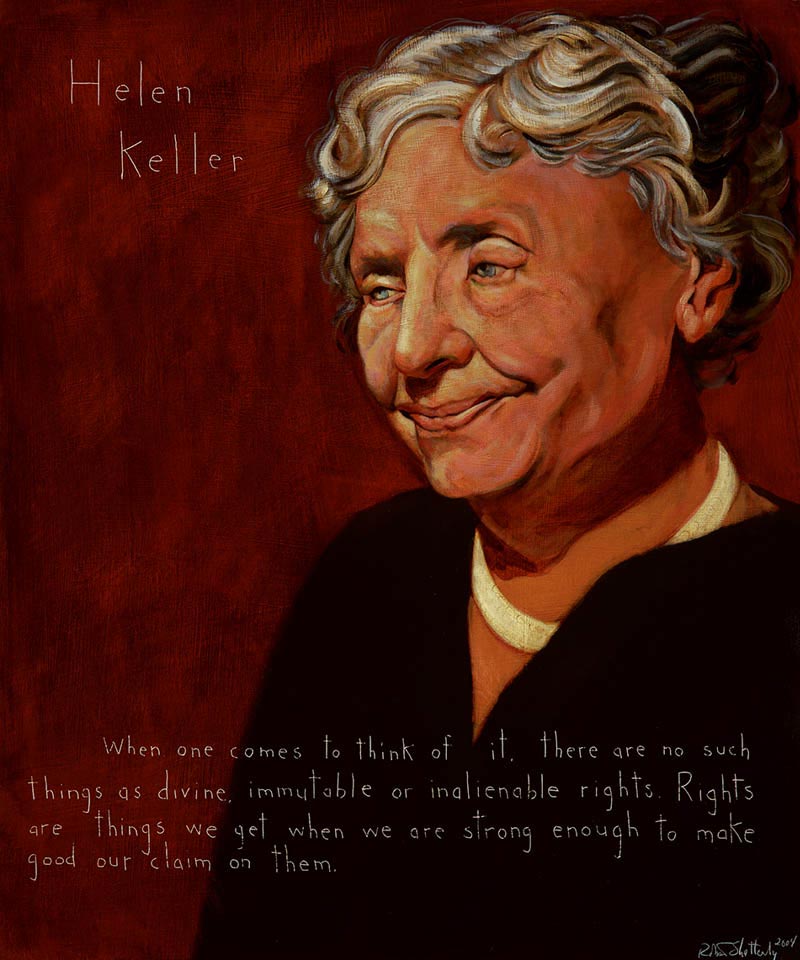
Helen Keller
Writer, Lecturer, Advocate for the disabled : 1880 - 1968
“When one comes to think of it, there are no such things as divine, immutable, or inalienable rights. Rights are things we get when we are strong enough to make good our claim on them.”
Biography
Born in northern Alabama, Helen Keller suffered a ‘brain fever’ (probably scarlet fever or meningitis) at age 19 months that left her blind and deaf. The disease also turned her into an out-of-control child, usually in a foul temper. Finally, in their own defense, her parents traveled to Baltimore to meet with Alexander Graham Bell. The famous inventor, who studied speech while working on his telephone, subsequently had become interested in educating deaf children.
Bell told the Kellers to contact the Perkins Institution for the Blind in Boston, which in turn recommended a former pupil, Anne Sullivan, as Helen’s teacher. The orphaned Sullivan, herself mostly blind since age five, also had had a difficult life, and desperately needed the work. In 1887 she came to Alabama and, after a stormy first month, got Helen to understand the concept of words during a famous encounter at the family’s water pump.
Keller made remarkable progress from that point and ultimately, with Sullivan’s help, graduated with honors in 1904 from Radcliffe University, the first deaf and blind person ever to earn a Bachelor of Arts degree. In an era when most women were not allowed careers, and the blind often were considered fit only to live in asylums, Keller’s impassioned writings and lectures (delivered through an interpreter) made a strong impression on audiences around the world.
Keller primarily is remembered for her advocacy for the disabled, but as a member of the Socialist Party, she also strongly supported such groups as the ACLU, IWW, and NAACP, and campaigned for birth control, civil rights, women’s suffrage, and world peace. “We, the people, are not free,” she once said. “Our democracy is but a name. We vote? What does that mean? It means we choose between Tweedledee and Tweedledum. We elect expensive masters to do our work for us, and then blame them because they work for themselves and for their class.”
The Miracle Worker, a play about Keller’s childhood education with Sullivan, won a Tony award in 1960, and then became a popular film, winning acting Academy Awards in 1962 for both Anne Bancroft (who played Anne) and Patty Duke (Helen). Keller was awarded the Presidential Medal of Freedom in 1964 by Lyndon Johnson. She is buried in the National Cathedral in Washington, D.C., where visitors over the years twice have worn the braille letters completely off the plaque by her grave.
Programs
Americans Who Tell the Truth (AWTT) offers a variety of ways to engage with its portraits and portrait subjects. Host an exhibit, use our free lesson plans and educational programs, or engage with a member of the AWTT team or portrait subjects.

Education
AWTT has educational materials and lesson plans that ask students to grapple with truth, justice, and freedom.

Exhibits & Community Engagement
AWTT encourages community engagement programs and exhibits accompanied by public events that stimulate dialogue around citizenship, education, and activism.